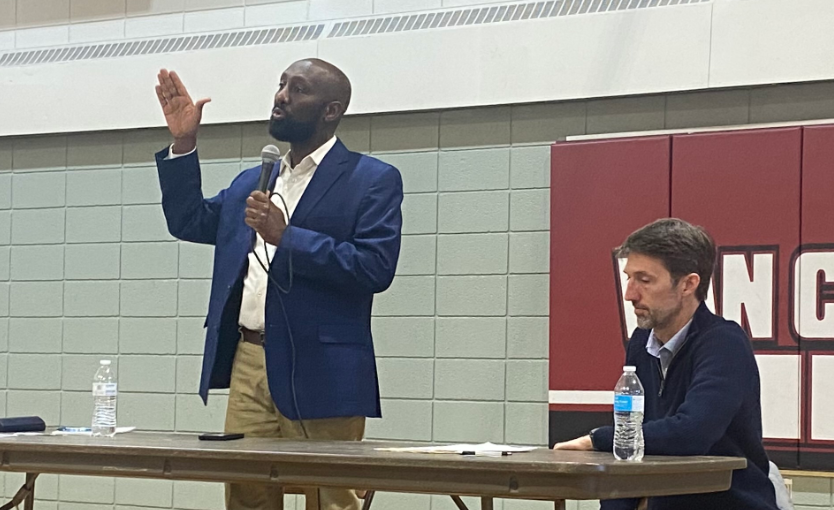The University of Minnesota’s Faculty Consultative Committee (FCC) introduced and discussed a resolution at a meeting Feb. 16 to articulate concerns about the treatment of faculty, professionals and administrators (P&A) and staff.
The Consultative Committee Leadership (CCL) resolution calls upon administration to create a better work environment that addresses those issues.
The CCL hosts regular meetings where all four University Senate leaders come together and converse.
The CCL resolution is currently a rough draft and the contents are being discussed among the consultative committee members.
The draft has four main principles: to provide liveable, equitable and competitive pay, to recruit, reward and retain employees, to invest in career advancement and to foster manageable workloads.
All chairs and vice chairs of the four University Senates have been involved in the creation of the resolution since it was first proposed, said Tony Fussy, the chair of the Civil Service Consultative Committee, in an email to the Minnesota Daily.
Throughout 2022, the CCL had discussions with faculty and staff about workload and compensation issues, FCC Chair Colleen Flaherty Manchester said
In the fall, the chairs of the committee on finance and planning, the committee on faculty affairs and the FCC decided to initiate what reinvestment in faculty and staff should look like, Flaherty Manchester said.
“Everything is intertwined,” Flaherty Manchester said. “The retention of faculty and staff impact the University’s ability to fulfill its mission and to educate students.”
Fussy said the CCL resolution is about investing in human capital, which is the University’s biggest expense and its biggest asset.
The resolution looks at ways to increase pay, retain employees and avoid the brain drain workers are experiencing due to the reduction in staff numbers across campus, Fussy said.
“[An] issue civil service employees face is feeling like we are more expendable employees since we are often seen as an administrative expense that needs to continually be cut,” Fussy said.
Many civil service employees are concerned with pay, according to Fussy. Faculty, civil service and P&A employees received a 1.5% salary increase for the 2022 fiscal year. For the 2023 fiscal year, there was a 3.85% merit pool available for campuses, colleges and units to use for merit pay.
Budget and staff cuts have resulted in civil service employees being burnt out, Fussy said.
“These issues have been on our priority list for years,” said Adolfo Carrillo Cabello, the chair of the P&A consultative committee.
Carrillo Cabello said the resolution started as a collective interest and effort by committee members to represent a unified voice that addresses the issues faculty and staff face at the University.
Each principle in the draft addresses P&A issues, such as the commitment from the University to foster a culture that includes manageable workloads and structures for work flexibility.
Flexible work arrangements can help retain and recruit employees in addition to increasing their ability to fulfill the University’s mission, Carrillo Cabello said. For example, academic advisors may be able to accommodate students beyond regular business hours through online platforms.
“The resolution packages all the issues we are looking at now, but it also looks into the future,” Carrillo Cabello said.
University workers react positively to the resolution’s principles
Heather Holcombe, an English lecturer, said she appreciates the resolution’s call to the University to make it a better overall environment for faculty.
Holcombe said she believes people need fair wages, job stability, pathways to promotion and work-life balance.
“I am especially encouraged that this resolution acknowledges how grossly underpaid we are,” Holcombe said.
Holcombe said the resolution holds weight by showing the value of faculty and staff at the University.
“It’s up to the University administration to demonstrate whether they recognize that value,” she said.
Courtney Gildersleeve, a cultural studies and comparative literature lecturer at the University, said the principles are strong and articulate, but she questions how they will be implemented.
“[Faculty and staff] hear about positive plans on the surface, but we don’t know where they’ll go,” Gildersleeve said.
According to Gildersleeve, the principles reflect the struggle of faculty and staff to make ends meet because they are not being paid a wage that reflects the cost of living.
“I think right now the amount that I get paid for classes is [about] the same as grad students, and I have a Ph.D.,” Gildersleeve said.
Gildersleeve said principle four, which asked for manageable workloads, reminded her of her experience feeling overwhelmed last year while teaching a core course of more than 220 students with four teacher’s assistants.
“Because you are an adjunct [professor] people assume you’ll take on anything,” Gildersleeve said.
Gildersleeve said she hopes the consultative committees on campus will have more extensive conversations with the people this resolution impacts most.
“I look forward for the resolution to be taken seriously and for the outlined set of principles to become a set of practices,” Gildersleeve said.
The CCL is currently incorporating feedback into the draft to enrich the resolution, Flaherty Manchester said.
“We think these principles are valuable,” Flaherty Manchester said. “We are trying to emphasize these are the things we want to strive for.”
The CCL aims to present the final draft of the resolution at the University Senate meeting on March 30 and will open it up for discussion with the Senate, Flaherty Manchester said. The University Senate would then vote on the resolution on April 27.
Correction: A previous version of this article misstated salary increases for University workers. Faculty, civil service and P&A employees received a 1.5% salary increase for the 2022 fiscal year.













